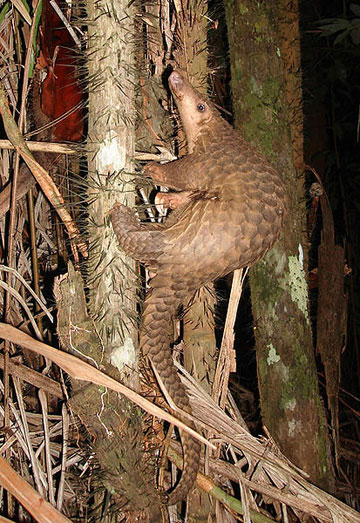You can buy pretty much anything on the internet: from Rugby team garden gnomes to Mickey Mouse lingerie. In some places, consumers have even been able to purchase illegal wildlife parts, such as ivory and rhino horn. In fact, the internet has opened up the black market wildlife trade contributing to the destruction of biodiversity worldwide. Pangolins, shy, scaly, anteater-like animals in appearance, have not been immune: in Asia the small animals are killed en masse to feed rising demand for Chinese traditional medicine, placing a number of species on the endangered list.
“Pangolins are used in traditional Chinese medicine and consumed as a tonic and delicacy, mainly in China,” Rhishja Cota-Larson, editor of the blog Project Pangolin. “Pangolins (especially the scales) are marketed as a treatment for many ailments, including boils, insufficient lactation in women, hysterics, malaria, jaundice, hepatitis, heart disease, strokes, comas—and worryingly, even cancer.”
Project Pangolin recently blogged about discovering pangolin scales and meat for sale on Alibaba.com, a major e-commerce site out of China. Pangolin meat was selling for $12,000-$15,000 a ton by one supplier on the site. The supplier wrote that it could provide thirty tons of meat a month, which would take around 2,000 poached pangolins (weighing about 15 kilograms a piece) to meet one month’s supply. It’s not suspiring then that rising demand for Chinese traditional medicine is largely behind the listing of two species of pangolin—the Sunda pangolin (Manis javanica) and the Chinese pangolin (Manis pentadactyla)—as Endangered by the IUCN Red List. The species are also listed as number 91 and 92 of the EDGE mammal’s list, which catalogues the world’s most endangered and evolutionary unique animals.
 A Sunda pangolin on the island of Borneo. Photo by: Piekfrosch. |
Once notified of the sale of pangolin meat and scales on their site, Alibaba.com responded by removing the content.
“The listing or sale of any animal (including any animal parts which may include pelts, skins, internal organs, teeth, claws, shells, bones, tusks, ivory and other parts) protected by the Convention on International Trade in Endangered Species of Wild Fauna and Flora (CITES) or any other local law or regulation is strictly forbidden on Alibaba.com,” Pamela Muñoz with Alibaba.com told mongabay.com. The website also forbids the sale of shark fins, cat or dog parts, and bear bile.
When asked how the pangolin products slipped past Alibaba.com’s regulations, Muñoz said, “Alibaba.com is a user-generated site and relies on a series of keyword filters to help ensure legitimate and ethical postings. As with anything, this system is not perfect and so, we also rely on our staff to go through the site for additional screening. With millions of listed products on the site, generated by our 72.8 million registered users, challenges to fully screen each new posting remain. As such, we also appreciate help by site users and groups, like Project Pangolin, to notify us if any questionable products on the site. Registered users can notify us through our site with the “Report Suspicious Activity” link; non-registered users can email registeredagent (@) hk.alibaba-inc.com directly.”
Muñoz adds that once they were informed of the illegal sale of pangolin parts on their site, Alibaba.com weas able to refine their filters to make it more difficult for the next criminal wildlife trader.
Cota-Larson says that she was happy with Alibaba’s swift action on the issue, but warns that the illegal wildlife trade persists as a serious issue for commerce companies online.
“The internet is a significant factor in the illegal wildlife trade and this certainly presents a challenge for any site that relies on
user-generated content,” she says. “Fortunately, online marketplaces and social networking sites are always striving to improve verification processes and
filters to keep undesirable content out. Each time something slips through the cracks is an opportunity to fine-tune the system.”
Aside from the Sunda and Chinese panolgin, two other Asian pangolin species—the Philippine pangolin (Manis culionensis) and the Indian pangolin (Manis crassicaudata)— are also imperiled, currently listed as Near Threatened. Pangolins make-up their own evolutionary order: Philodata with their closest living relatives being carnivores, even though pangolins only eat insects and look little like the world’s predators. Project Pangolin estimates that 40,000 to 60,000 pangolins may have been killed for food and medicine in 2011.
So, the question, as it always is with endangered species, remains: will regulations, laws, and societal changes come in time to save these elusive, nocturnal, forest-dwellers from extinction or will pangolins one day vanish entirely from Asia’s forests.
Related articles
Over 20,000 pangolins illegally poached in Borneo

(10/28/2010) Notebooks confiscated by the Sabah Wildlife Department (SWD) reveal that 22,000 Sunda pangolins (Manis javanica) were illegally poached from May 2007 to January 2009 in the Malaysian state in northern Borneo. The number, in fact, may be significantly higher since the logbooks didn’t cover over a third of the time period. The logbooks were analyzed by TRAFFIC, an organization devoted to combating the illegal trade in wildlife.
China seizes over 2,000 illegally trafficked pangolins
(07/14/2010) Boarding a suspect fishing vessel in the early morning of June 6th, Chinese customs officials discovered 2,090 frozen pangolins and 92 cases of pangolin scales, weighing an astounding 3,960 pounds. Manned by five Chinese and one Malaysian national, the boat was awaiting instructions via satellite phone as to where to meet another ship to transfer the illegal cargo while still at sea.
Pangolins threatened by illegal trade for traditional Chinese medicine
(07/14/2009) While their trade has been prohibited under the Convention on International Trade in Endangered Species of Wild Fauna and Flora (CITES) since 2002, Asian pangolin populations are rapidly declining due to poaching for use in traditional Chinese medicine, report conservationists. Trade has nearly wiped out the species in Cambodia, Viet Nam and Laos, once strongholds for the scaly, toothless anteater.